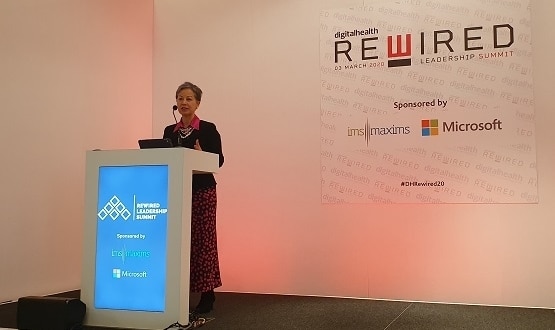TechUK president Jacqueline de Rojas has delivered the opening keynote address at the Digital Health Rewired 2020 Leadership Summit, highlighting the importance of fostering diversity in healthcare to ensure technology caters to the needs of the NHS and the people it serves.
Speaking at London Olympia on 3 March, de Rojas said that under-representation of women and minority groups across healthcare risked unconscious bias being built into new technologies, which posed a greater risk as the health sector becomes more dependent on new technology to cope with increasing demands.
“Unconscious bias is something we really have to look at quite carefully,” said de Rojas.
“The decisions in our lives are increasingly being made by algorithms that determine whether we get that job interview, that loan.
“We need to make sure that the people who design those algorithms are diverse and represent the markets they serve.”
De Rojas warned of the dangers of ignoring and accepting biases in technology design.
She suggested that if suppliers didn’t employ diverse perspectives from conception to creation, they would end up with “a sub-optimal product at best, and a truly awful product at worst”.
By way of example, de Rojas pointed out that crash-test dummies were designed for men until 2011, meaning women were typically more likely to be injured in car accidents due to design flaws.
She continued: “The health sector is increasingly dependent on new tech for innovation, efficiency and to support our ability to serve citizens at scale in the future. It demands automation and means we must keep up with that pace of change, and the demands on the NHS.
“If technology doesn’t work for all of us it will perpetuate the same biases we see today at great speed and great scale.”
@JdR_Tech what would AI algorithms make of the fact there are so few female and BAME board members? Would they embed the bias in the AI. Interesting thought to open #DHRewired20 pic.twitter.com/EN57obrUVK
— Ade Byrne 🇮🇪 🏂 🇪🇺 risk to society, esq (@AdeByrne) March 3, 2020
On the NHS workforce de Rojas noted that, despite having a predominantly female workforce, it still suffered a shortage of women in leadership roles, with black and ethnic minority (BAME) backgrounds particularly underrepresented.
De Rojas credited work being undertaken by the Shuri Network, which provides a platform to propel BAME women in careers in healthcare leadership roles, especially where they are “grossly underrepresented.”
However, she stressed that the only way to embed diversity into the workforce and wider society long-term, was to “facilitate open discussions and tolerant leadership teams to embrace it from the top-down”.
She also said that diversity meant inclusion across societal, regional and neurodiversity spectrums.
Hearing @JdR_Tech knocking it out of the park talking about how #diversity matters in health tech not just for the moral argument, but because this impacts on #patientsafety. And it's everyone's job. #DHRewired20 @NetworkShuri @CCriadoPerez @digitalhealth2 pic.twitter.com/xTQmGEVpsA
— Ayesha Rahim (@AyeshaRahimCCIO) March 3, 2020
Diversity is not something that we do, it is something that we are @JdR_Tech @techUK @DHRewired @IMSMAXIMS #DHRewired20 let’s change our leadership styles and embrace @NetworkShuri @digitalhealth2 @NHSX @NHSDigital pic.twitter.com/TKgGhDflzO
— Shane Tickell (@ShaneTickell) March 3, 2020
“One-off diversity efforts are simply not effective in creating an inclusive environment…. it is not the rise of robots we should worry about, but that we re-skill ourselves every five years or less if we are to thrive in a digital future,” de Rojas said.
“We are fortunate in the UK because we have the best of both worlds: a proud NHS heritage employing the finest doctors, nurses and medical teams in the word, who treat anyone, no matter their background and social circumstances.
“We are also proud to champion private companies, doing state-of-the art work.”
“The true potential of [the NHS] can be realised only when it has an ambitious and diverse workforce to match.”

